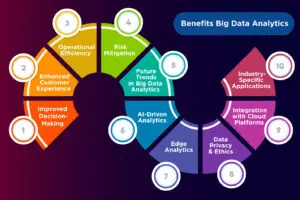The way data is used nowadays has become an integral part of businesses as it presents the decision-makers with evidence which further prompts the strategy-making process. We often see people on social media talk about their views, whether they are positive or negative, it is still data to be considered.
A lot of information is put out on the internet which is really hard to go through. Segregating through them is a challenging task, but Big Data Analytics has the capacity to make it easier for the organizations.
In this post, we will check out how Big Data supports businesses with their plans, emerging trends, and practical strategies they can implement to unlock its full potential.
What is Big Data Analytics?
In simple terms, Big Data Analytics is an analysis of the large and sophisticated amount of data captured to find out trends, patterns and other valuable insights, which helps businesses in making better decisions and growth.
Big data analytics has transformed how businesses approach planning, decision-making, and growth strategies. By processing vast amounts of structured and unstructured data, companies can uncover valuable insights that shape smarter decisions and drive innovation.
Significance of Big Data Analytics
Big data analytics is important because it can interpret large amounts of data. Traditional methods are insufficient to handle today’s data-driven environment, where companies collect information from countless sources, such as customer interactions, online behavior, and IoT devices
Improved Decision-Making
Analytics tools enable leaders to base decisions on facts and patterns rather than intuition.
Enhanced Customer Experience
Personalized marketing and real-time support are made possible by analyzing customer data.
Operational Efficiency
Businesses use operational data analysis to find inefficiencies and optimize workflows.
Risk Mitigation
Proactive solution creation and risk prediction are aided by predictive analytics.
Future Trends in Big Data Analytics
The evolution of big data analytics is still redefining industries till date. Future trends point toward even more powerful applications, such as:
AI-Driven Analytics
Artificial intelligence (AI) enhances data interpretation, automating the extraction of actionable insights. Machine learning models improve accuracy over time, leading to better predictions and real-time applications.
Edge Analytics
As IoT adoption grows, edge analytics processes data closer to its source, reducing latency and enabling faster decision-making. This trend is particularly useful in industries like healthcare and logistics.
Data Privacy and Ethics
As regulations like GDPR and CCPA tighten, companies must adopt ethical practices and secure data handling to build trust with consumers.
Integration with Cloud Platforms
Cloud-based big data solutions simplify access to analytics tools and make collaboration seamless, especially for remote teams.
Industry-Specific Applications
Custom solutions tailored to industry needs—such as precision agriculture, personalized healthcare, or autonomous vehicles—will continue to gain prominence.
How Big Data Analytics Supports Business Strategies
Enhancing Strategic Planning
Big data analytics assists companies in matching their objectives with consumer needs. Companies can analyze trends, customer preferences, and competitor activities to develop more effective strategies. Retailers, for example, estimate demand and improve inventory management using sales data.
Strengthening Marketing Campaigns
By studying customer behavior and purchase patterns, marketers can design personalized campaigns that resonate with target audiences. The best time and channels for promotions can also be found via predictive analytics.
Driving Product Innovation
Analyzing customer feedback, industry trends, and performance data allows businesses to identify unmet needs and innovate accordingly. This data-driven approach minimizes risks connected with new product introductions.
Boosting Supply Chain Efficiency
Big data analytics optimizes supply chain processes by providing insights into production cycles, delivery times, and vendor performance. Companies can identify bottlenecks and implement corrective measures in real time.
Enhancing Customer Retention
Customer retention strategies thrive on deep insights into preferences, complaints, and satisfaction levels. Businesses can encourage loyalty and sustained engagement by anticipating churn and taking proactive measures to address issues.
Practical Implementation Strategies
Define Clear Goals
Before investing in analytics, businesses must identify what they aim to achieve, whether it’s improving efficiency, enhancing customer satisfaction, or increasing revenue.
Choose the Right Tools
Selecting appropriate tools for data collection, storage, and analysis is essential. Popular platforms like Hadoop, Spark, and Tableau offer flexible solutions for diverse business needs.
Build a Skilled Team
Employing data analysts, data scientists, and business intelligence experts ensures effective data interpretation and application.
Embrace Data Integration
Combine information from several sources to obtain a comprehensive picture. Unified datasets provide more accurate insights and reduce redundancy.
Monitor and Optimize
Analytics is an ongoing process. Businesses must continuously monitor performance, refine models, and adapt to changing trends.
Conclusion
The capacity of big data analytics to convert unprocessed data into useful insights is what gives it its power. By leveraging this technology, businesses can develop data-driven strategies, adapt to market dynamics, and drive innovation. As future trends push the boundaries of analytics, companies must embrace these advancements to remain competitive and maximize value.
Also Read:


